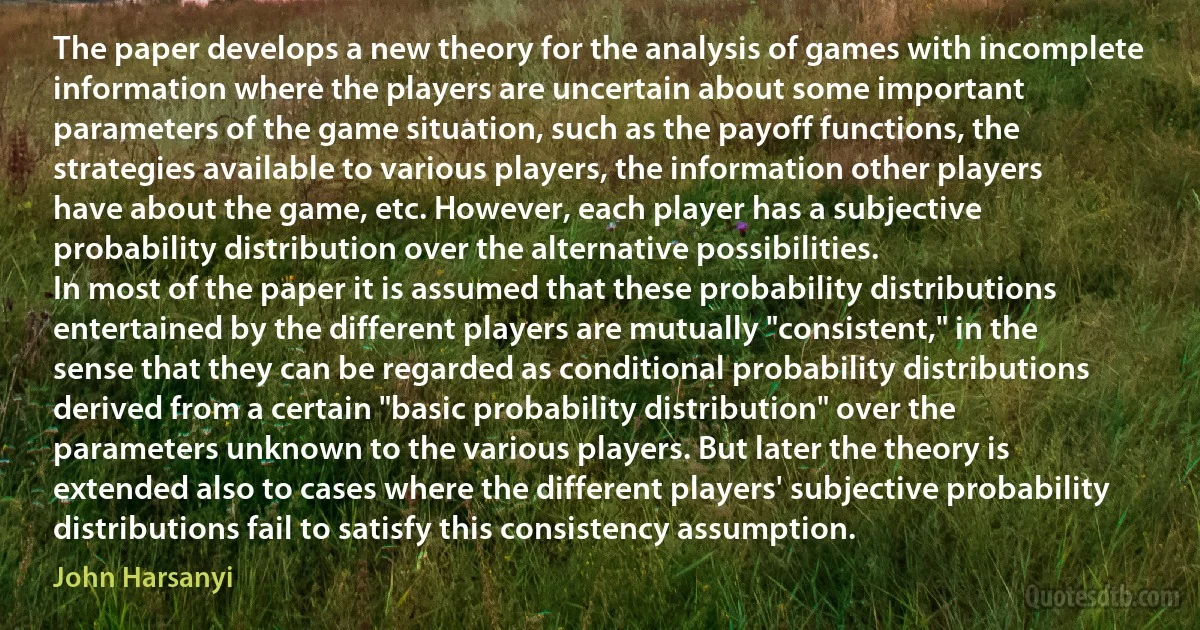
The paper develops a new theory for the analysis of games with incomplete information where the players are uncertain about some important parameters of the game situation, such as the payoff functions, the strategies available to various players, the information other players have about the game, etc. However, each player has a subjective probability distribution over the alternative possibilities. In most of the paper it is assumed that these probability distributions entertained by the different players are mutually "consistent," in the sense that they can be regarded as conditional probability distributions derived from a certain "basic probability distribution" over the parameters unknown to the various players. But later the theory is extended also to cases where the different players' subjective probability distributions fail to satisfy this consistency assumption.
John HarsanyiRelated topics
alternative assumption basic certain conditional consistency different distribution fail game later paper probability sense situation uncertain unknown etc payoffRelated quotes
Production, and production alone, can find us relief in our immediate situation. It is no part of the British character to resign ourselves to such difficulties or to fail to take the measures, however hard, to overcome them. It has been truly said that by our faith we can move mountains. It is by our faith in ourselves, in our country, in the free democratic traditions for which the people of this country have for centuries fought and battled, and for which they must fight again as willingly on the economic front as upon the oceans, on the land and in the air, it is by our faith in the deep spiritual values that we acknowledge in our Christian faith, that we shall be enabled and inspired to move the present mountains of our difficulties, and so emerge into that new and fertile plain of prosperity which we shall travel in happiness only as the result of our own efforts and our own vision.

Stafford Cripps
I also knew the formula that expresses the energy distribution in the normal spectrum. A theoretical interpretation therefore had to be found at any cost, no matter how high. It was clear to me that classical physics could offer no solution to this problem, and would have meant that all energy would eventually transfer from matter to radiation. ...This approach was opened to me by maintaining the two laws of thermodynamics. The two laws, it seems to me, must be upheld under all circumstances. For the rest, I was ready to sacrifice every one of my previous convictions about physical laws. ...[One] finds that the continuous loss of energy into radiation can be prevented by assuming that energy is forced at the outset to remain together in certain quanta. This was purely a formal assumption and I really did not give it much thought except that no matter what the cost, I must bring about a positive result.

Max Planck
An honest man, armed with all the knowledge available to us now, could only state that in some sense, the origin of life appears at the moment to be almost a miracle, so many are the conditions which would have had to have been satisfied to get it going. But this should not be taken to imply that there are good reasons to believe that it could not have started on the earth by a perfectly reasonable sequence of fairly ordinary chemical reactions. The plain fact is that the time available was too long, the many microenvironments on the earth's surface too diverse, the various chemical possibilities too numerous and our own knowledge and imagination too feeble to allow us to be able to unravel exactly how it might or might not have happened such a long time ago, especially as we have no experimental evidence from that era to check our ideas against.

Francis Crick
In our opinion, certain changes must be made in the conduct of international affairs, systematically subordinating all concrete aims and local tasks to the basic task of actively preventing an aggravation of the international situation, of actively pursuing and expanding peaceful coexistence to the level of cooperation, of making policy in such a way that its immediate and long-range effects will in no way sharpen international tensions and will not create difficulties for either side that would strengthen the forces of reaction, militarism, nationalism, fascism, and revanchlsm.
International affairs must be completely permeated with scientific methodology and a democratic spirit, with a fearless weighing of all facts, views, and theories, with maximum publicity of ultimate and intermediate goals, and with a consistency of principles.

Andrei Sakharov
It is with considerable reluctance that I criticize the monetarists, because, though I consider their proposed monetary policy unfeasible, they are after all much more nearly right in their assumptions and prescriptions than the majority of present academic economists. The simplistic form of the quantity theory of money that they hold is not tenable; but they are overwhelmingly right in insisting on how much "money matters," and they are right in insisting that in most circumstances, and over the long run, it is the quantity of money that is most influential in determining the purchasing power of the monetary unit. Other things being equal, the more dollars that are issued, the smaller becomes the value of each individual dollar. So at the moment the monetarists are more effective opponents of further inflation than the great bulk of politicians and even putative economists who still fail to recognize this basic truth.

Henry Hazlitt
